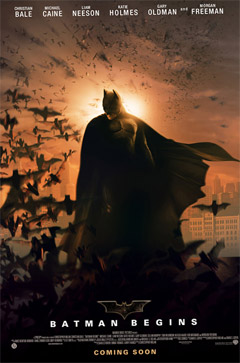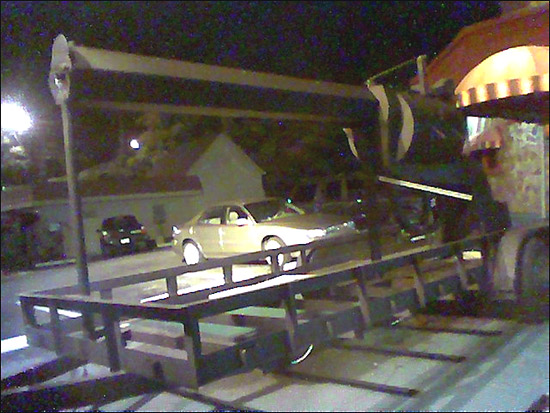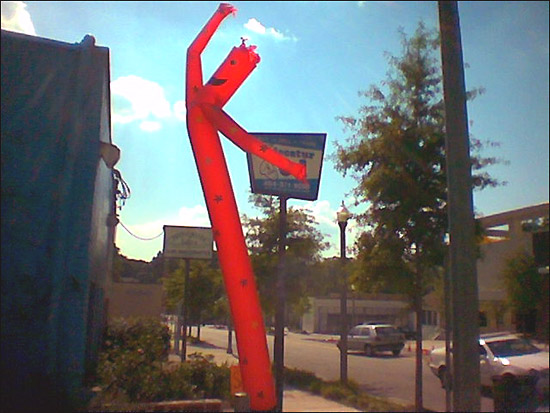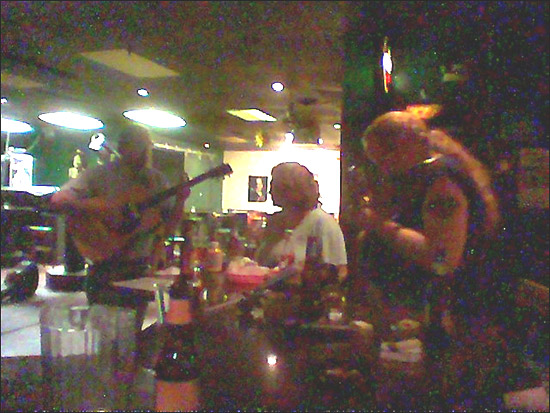-
Saw Batman
 Eric and I saw Batman Begins on Saturday night. I have to say I recommend it highly. They stuck close with Frank Miller’s “Year One” series and portrayed Bruce Wayne as a dark, angry figure, with none of the campyness that characterized the television series. Christian Bale performs very well as Bruce Wayne and Batman, the other characters did excellent jobs as well.
Eric and I saw Batman Begins on Saturday night. I have to say I recommend it highly. They stuck close with Frank Miller’s “Year One” series and portrayed Bruce Wayne as a dark, angry figure, with none of the campyness that characterized the television series. Christian Bale performs very well as Bruce Wayne and Batman, the other characters did excellent jobs as well.The Ras Al Gul character was a bit different, in the movie, he plays more of a spiritual leader (to put it nicely) in the comic book he ‘s more of a genocidal eco-terrorist. The Henri Ducard role is different as well (at least different that the Joe Hamm story I read.) Scarecrow was extremely well done, and Gary Oldman could not have done a better job.
Missing, curiously was any mention of Batman as the world’s greatest detective, though one can’t have everything.
After the movie Eric and I had dinner at the Rusty Nail, AKA the Smoking Gun (informally named after the barbecue smoker pictured below.

Of no significant import was the waving man outside of Decatur CD. I don’t mention it because of any great significance, but mostly because the photo turned out well.
And that was my Saturday. -
Shaking my faith in the role of women in society
Whenever I need to feel smugly superior I read the “Woman to Woman” feature in the Atlanta Journal Constitution, where a pretentious left-leaning woman debates a cloying right-leaning woman. Naturally I was interested in this weeks topic Should medical marijuana be legalized?
The left starts out with an irrelevant racial remark, then takes the remark back, taking up about half of her column, and then somehow using up all of her remaining space to issue a strawman attack at religion (why? Who knows), then closes with
While some argue medical marijuana can be addictive, few would contend it has the same dependency risk as the medications hospitals routinely administer for debilitating pain. Conservatives aren’t clamoring for hospitals to turn off the morphine drip for dying cancer patients because there?s a heroin problem in the world. But they want to draw a line in the sand over medical marijuana? Please. Show me the logic.
Which is to say….. Well, I’m not sure exactly. Marijuana is being treated differently than heroin, which is not the same thing as marijuana? Is that actually a reason?
And quote frankly, how can she miss the actual strong arguments in favor of legalizing medical marijuana, namely, federalism, wasted government resources, the fact that none of the “dangers” of marijuana apply to say, 60 year old cancer patients, the chilling effect this has on medical research and treatment, the loss of privacy, etc.
That was the logical cesspool that is left-leaning Diane Glass. Then she gets topped by right- leaning Shaunti Feldhahn. She leads with a personal story, then closes with
I suspect that pro-medical marijuana opinions are less about ensuring the availability of treatments unavailable anywhere else, and more about legally getting high.
When I oppose legalizing backyard marijuana, I am not being heartless toward those with chronic conditions who use it to relieve their suffering. By championing other effective, controlled options, I am trying to spare other individuals and the public health the even greater suffering from, yes, that ‘slippery slope’ that countless of us have experienced firsthand: that marijuana is not a harmless drug and its use can go terribly awry.
To answer her ad hominen attack, I support the legalization of medical marijuana, and I have no interest in getting high, legally or otherwise.
As for her closing paragraph, it so uniformly ridiculous I don’t know where to begin. None of the problems associated with marijuana as a “gateway” drug (even if you believe in that as a concept) apply to the people who would take medical marijuana.
What combination of circumstances would have to exist for her statement to be true, accurate and altruistic? You would have to have cancer patients who have no interest in selecting the best treatment for their cancer, who are utterly incapable of differentiating between treatments like Marinol (incidentally, Marinol must be swallowed and kept down for a prolonged period of time, not the easiest thing to do during chemotherapy) and smoked marijuana.
It would also have to be true that outsiders, with no specific knowledge of the medical condition in question would know more about the cancer and the patient than the patient and his/her doctor. They would also have to be more concerned about this patient than the patient himself.
It would also have to be true that the same dangers that exist with marijuana as a “gateway” drug (even if you believe in the concept) apply to a 60 year old woman with breast cancer the same way they apply to 17 year old angst ridden teenagers. And what substance doesn’t have the potential to go “terribly awry”?
This turned into quite a little rant.
-
News of the weird, tragic, sad and evil
Bono Horrified By Attack On Aid Worker – an article about Muslim women in Ethiopia attempting to murder a woman (via stoning) for breast feeding in public. That’s bad enough, but notice the headline, it’s not “Attack on Aid Worker”, it’s Bono’s reaction to it. Media priorities are nauseating.
PETA employees charged with animal cruelty – an accurate headline, and a very weird story.
-
Pileing on Europe
Robert Samuelson of the Washington Post joins the chorus of people who think that Europe has some major problems.
-
A most amusing conversation
Searching Far And Wide For Cycling Companion
It all sounds so innocent doesn’t’ it? Somehow a conversation about adjectives in classified ads goes from helpful advice to personal threats to 9-11 conspiracy theories in a mere 19 posts. HT: The Agitator
-
That annoying media of ours
I was reading The Model School, Islamic Style recently and had the thought, does the media only interview histrionic pretentious American Muslims?
The article is about a Muslim school outside of Chicago. To Quote
The second order of business is creating what Universal calls an “Islamic environment.” The Koran and the sayings of Muhammad are taught two days a week, Arabic three days a week. Grades 2 to 12 break for prayer once a day. Beyond Scripture, a Muslim approach influences the traditional curriculum as well. When teacher Fuzia Jarad’s English class read Romeo and Juliet, the girls wanted to know, “Is it love at first sight?” “Yes,” the teacher answered. “As Muslims, we don’t do that. The difference is lust versus love; appearance versus knowing. Islam protects you from mistakes.” For assistant principal Abdallah, who is in charge of discipline, love is a big issue. “I’ve had students come to me and say, “So and so are in love. Everyone is gossiping about the girl. Her reputation is ruined.’I tell them, ‘If you care, show respect and stop the discussions.’ Sometimes a girl or boy will tell me about a love letter they’ve received. It’s always a letter. They can’t socialize. They don’t want the letter. They don’t want to get in trouble. The feelings for each other are natural. Islam gives us a way to approach those feelings. Choose your spouse, but don’t give your body or soul to someone until you’re married.”
What’s central to the environment is a sense of Muslim family values. That’s why Mohammad (Mo) Suleiman sent his daughter Samia, 18, to Universal. “Family means the older have mercy on the younger,” says Suleiman, “and the younger respect the older.” The students seem to make an effort, but cultural isolation is impossible. “My dad will hear the word love when I play my music, and he’ll say that’s against our religion,” says freshman Ryan Ahmad. “So I’ll stop for a week. But then one of my friends will start singing some lyric, and I start up again.” When freshman Gulrana Syed watches TV, she tries to stick with family shows but gives in to the temptation to watch Fear Factor. “If swearing starts,” she says, “I turn it off and hope God forgives me.”
Though the school and the parents want their kids to be successful in America, the ambivalence of many Islamic parents sends mixed signals. The pull of their home country is a constant distraction from fitting into this one. “They are obsessed with foreign politics,” says Steve Landek, who has been mayor of Bridgeview since 1999. “I come to talk to them about better sidewalks. They want to know how to run for Congress so they can change America’s Israeli policy.” Clearly respectful, however, of the economic and cultural contributions of Muslims to the community, he regrets to say 9/11 has set them back. “I still hear comments. I’m not going to repeat them. I’m not going to perpetuate the negative.”
and
The students next door sometimes give voice to the commonplace resentment that can be found among Muslims the world over. Assigned by his English teacher to write an essay about his own American Dream, a 15-year-old wrote that the occupied territories should be returned to the Palestinians and “the Jews should be left to suffer.” More often, however, Universal’s students feel resentment about being stereotyped, both in the media and on the streets. To senior Ali Fadhli, the Fox TV show 24, which had a plot this season about a Muslim terrorist cell, is “obnoxious,” he says. “America has moved on to a new enemy. We’re treated now like the Russians were during the Cold War.” Being teenagers though, perhaps the worst slight of all is being regarded as outsiders. “The students are aware,” says Dalila Benameur, head of the social studies department, “that they are perceived as different.” Says freshman Gulrana Syed: “It’s kind of impossible to blend in wearing a head scarf.” Student Ryan Ahmad, whose dad is his toughest music critic, admits, “Americans seem to have more fun. Muslims try to be American, but we don’t know how. The cultures are so different.” A sense that U.S. life has its own contradictions provides some perspective. Senior Muna Zughayer, noting the use of women as sex objects, says, “I think it’s funny people look at us and say we’re oppressed!”
So, in other words, they go to lengths to maintain their own culture and traditions, they voluntarily segragate themselves in education, visibly and publicly remove themselves from American mainstream culture, present a monolithic public face, and have strong loyalties to other countries.
Then they wonder why they don’t fit in the with the culture they’re rejected. You can’t be different without being different.
I guess the question is: Does the media deliberately seek out these people and ignore the rest of American Muslims or do they seek out the media. With the exception of finding out the Dave Chappelle was a Muslim (also in Time magazine), I can’t remember any other mention of American Muslims where that was a detail and not the focus. One never reads about, say some dentist who invented a new method of flossing, who got the idea on the way to prayers (or something like that). To put it another way, is the only public Muslim someone who is professionally Muslim?
-
To justify getting a laptop
OK, I’m trying to justify the expense of getting a laptop and I’m trying to list out all of the ways I would use it.
- With GPS unit, as a navigation tool on long trips (I have plans to mount it to the car to some degree.
- To play music while in the car, sort of a massive I-Pod
- With some sort of internet service, as a way to avoid traffic problems using Traffic.com, Georgia Navigator and such (I’m sure a Google Maps port is on the way soon.)
- Recording the various bluegrass jams I go to, I would have to get an outside device to do it properly.
- For use on trips
Can anyone think of any other uses?
-
Catch Up Day
As work has finally relented a tad, here are the links I’ve been meaning to post
- The Moving GMAP, a combination of Google Maps and GPS data, I need to get me one of them.
- The best curved corners code I’ve seen yet.
- James Lileks is a very good writer.
And here is a very grainy photo of the usual Jakes’ bluegrass crew. From left to right is Jim (playing Beths’s guitar, he usually plays dobro), Beth, and Walter on mandolin.

-
Quote of the moment
“The smart money is on gravity.”
For better one’s, check out WikiQuote on H.L. Mencken.
-
The Pernell Whitaker Post
As I remarked in an earlier post, the defensive boxing style of Pernell Whitaker changed my view of the world.
It is a matter of precision,. Were one to break boxing down four factors it would be speed, power, direction and angle. Whitaker was able to perceive the speed of a fighter, his power from a certain position, his exact balance, and the angle between him and his opponent to a much finer degree than any of his opponents. As Pop would put it, he could measure to three decimal places, while his appoints where stuck at one. This more exact information allowed him to go almost his entire career without taking a punch while delivering perfectly places punches himself.
The lesson I suppose is that an incremental improvement in perception allows a categorical change in the quality of the action.